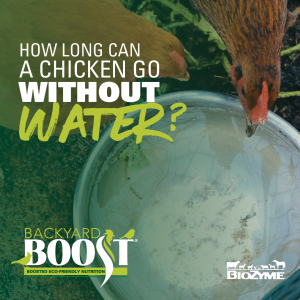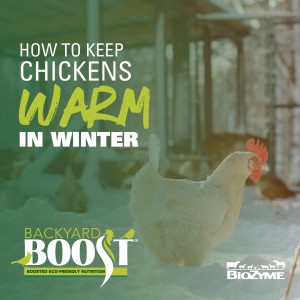
Chicken Heat Stress
Warmer days are just ahead, and that means it is time to protect your feathered friends from frying. Chicken heat stress is a real condition. We don’t want any ruffled feathers during the hot and humid days of summer.
At BioZyme®, makers of Backyard Boost®, we believe in care that comes full circle for every animal. That care comes in all forms, from animal health and nutrition to keeping our animals cool and stress-free. Let’s explore how heat stress can impact your feathered flock, what signs and symptoms to look for and how to prevent that for a stress-free summer.
When does heat stress happen in chickens?
Heat stress in chickens can occur when environmental temperatures rise to levels that exceed the bird’s ability to disperse heat and regulate body temperature effectively.
Heat stress is a combination of temperature and humidity. The thermoneutral zone is the range of environmental temperatures at which a living being can maintain its body temperature. For most poultry, this zone is between 60 and 75 F. This zone represents the temperature range where heat production is lowest.
As temperatures increase toward 85 degrees F, the birds will adjust their behavior and decrease feed intake and production. These changes help prevent the bird’s core body temperature from increasing. However, mild heat stress starts to occur at about 86 degrees.
Why does chicken heat stress happen?
We’ve discussed that heat stress typically occurs due to the onset of high temperatures and humidity; however, there are deeper reasons that heat stress happens. Let’s look into these 8 reasons a little more closely.
1. High Ambient Temperatures
Exposure to high environmental temperatures, especially during hot summer months or in regions with hot climates, is a primary cause of heat stress in chickens. When temperatures exceed the bird’s thermoneutral zone (approximately 60-75°F or 13-24°C for adult chickens), heat stress can occur.
2. High Humidity Levels
High humidity levels can intensify heat stress in chickens by impairing the bird’s ability to dissipate heat through evaporative cooling. Humidity reduces the effectiveness of panting, the primary mechanism for heat loss in birds, leading to increased body temperature and heat stress.
3. Poor Ventilation
Inadequate ventilation and airflow in poultry houses or chicken coops can trap heat and humidity, creating a microclimate that contributes to chicken heat stress in. Poor air quality and stagnant air can worsen heat stress and increase the risk of respiratory problems.
4. Overcrowding
Overcrowding in chicken coops and poultry houses can restrict airflow, increase heat production from bird metabolism, and limit access to water and shade. All those issues contribute to heat stress in chickens.
5. Lack of Shade & Shelter
Inadequate access to shade and shelter from direct sunlight can expose chickens to excessive heat and solar radiation, increasing the risk of heat stress. Providing shaded areas, shelters and natural vegetation can help mitigate the effects of heat stress and protect chickens from sun exposure.
6. High Stocking Density
Stocking density, or the number of birds per unit area, can worsen heat stress by increasing heat production and metabolic heat load within the flock. Lower stocking densities and proper spacing between birds can help reduce the risk of heat stress and promote airflow and ventilation.
7. Lack of Water Access
Dehydration is a common consequence of heat stress in chickens. Insufficient access to clean, fresh water can intensify dehydration and electrolyte imbalances, further compromising the bird’s ability to cope with heat stress.
8. Age & Breed
Young chicks, older birds and specific breeds of chickens may be more susceptible to heat stress due to differences in heat tolerance, metabolic rate and feather coverage.
Now that we know the reasons that chicken heat stress occurs, let’s explore what to look for if you’re worried about heat stress.
Signs of Chicken Heat Stress
Heat stress can have serious consequences for backyard chickens. Recognizing the signs and symptoms early is crucial for preventing illness and death. Here are some common signs and symptoms of heat stress in backyard chickens:
Panting & Open Mouth Breathing
Panting is a natural mechanism for chickens to regulate their body temperature. During heat stress, chickens may exhibit rapid, open-mouth breathing as they try to dissipate heat and increase airflow over their respiratory surfaces.
Wings Spread & Drooping
Chickens may spread their wings away from their body or hold them in a drooped position to increase heat loss through evaporative cooling. This is a cooling mechanism and a sure sign that your chickens are experiencing heat stress.
Seeking Shade, Lethargy, Weakness & Prolonged Resting
Heat-stressed chickens may appear lethargic, listless and reluctant to move. They may exhibit weakness, lack of coordination and decreased activity levels. Think about how you feel in excessive heat. Your birds are no different.
Chickens may also seek shade, shelter or cool, shaded areas to escape direct sunlight and reduce heat exposure. They may spend more time resting or lying down to conserve energy and reduce heat production.
Reduced Feed & Water Intake
Heat-stressed chickens may reduce their feed and water intake as they try to conserve energy and minimize metabolic heat production. Decreased water consumption can lead to dehydration and electrolyte imbalances.
Pale Comb & Wattles
The comb and wattles of heat-stressed chickens may become pale, dry and shriveled due to reduced blood flow and dehydration. Dark-colored combs and wattles are especially vulnerable to heat absorption and overheating.
Reduced Egg Production
Heat stress can disrupt the egg-laying cycle in hens, decreasing egg production or temporarily stopping laying altogether. High environmental temperatures can also affect reproductive function and hormone production in laying hens.
Increased Vocalization
Heat-stressed chickens may exhibit increased vocalization, agitation and distress calls as they try to communicate discomfort or seek relief from the heat. If your chickens are louder than normal, it is a sign of distress, so pay attention.
Diarrhea & Wet Droppings
Heat stress can lead to digestive disturbances in chickens. Heat stress also causes watery droppings in chickens due to increased water intake, reduced feed digestion and electrolyte imbalances.
Increased Mortality
Severe heat stress can lead to heatstroke, organ failure and ultimately death in backyard chickens. This is especially true when temperatures exceed 100 degrees and if prompt intervention and cooling measures are not implemented.
Early recognition of signs and symptoms of heat stress allows for timely intervention. If you’re noticing your chickens suffering from these symptoms, make sure to contact your vet. Depending on their recommendation, it may be worth providing cooling measures, electrolyte supplementation and veterinary care. These interventions can potentially prevent heat-related illness and mortality in backyard chicken flocks.
So, how do you ensure that your flock never struggles with heat stress? Let’s examine some best practices for preventing chicken heat stress.
Heat Stress Prevention for Backyard Chickens
An ounce of prevention is worth a pound of cure. Preventing heat stress in backyard chickens requires proactive management practices and attention to environmental conditions. Here are some strategies to help prevent heat stress in your backyard flock:
Provide Adequate Ventilation & Optimize Coop Design
Ensure proper ventilation in the chicken coop or housing structure to promote airflow and heat dissipation. Install windows, vents and fans to facilitate air circulation and prevent the buildup of heat and humidity.
Design the chicken coop with heat management in mind. Choose light-colored roofing materials and reflective surfaces to minimize heat absorption. Install insulation and reflective barriers to reduce heat transfer and maintain comfortable temperatures inside the coop.
Offer Shade & Shelter
Provide ample shade and shelter options for chickens to seek relief from direct sunlight and heat. Use natural vegetation, trees, awnings or tarps to create shaded areas in the chicken run or yard.
Ensure Access to Fresh Water
Provide clean, fresh water at all times to prevent dehydration and promote hydration in chickens. Use multiple water sources and consider adding electrolytes or vitamin supplements to the water during periods of extreme heat.
Every time you give your chickens fresh, clean water don’t forget to add Backyard Boost® Defense to the water. Backyard Boost Defense is a liquid supplement for poultry designed to support digestion and a healthy immune response. Packed with nutrients needed in times of stress, it also contains AO-Biotics® Amaferm®, a prebiotic research-proven to enhance digestibility. The “green stuff” promotes water intake and hydration.
Cooling Measures
Implement cooling measures to help chickens cope with high temperatures. Place shallow pans or trays of cool water in shaded areas for chickens to stand in or wade through. Use misters, sprinklers or foggers to create fine water droplets and cool the surrounding air.
Adjust Feeding Schedule
Offer feed during the cooler parts of the day, such as early morning or late evening, to encourage chickens to eat when temperatures are lower. Consider providing chilled or frozen treats, such as fruits or vegetables, to help chickens stay hydrated and cool.
Limit Activity During Heat
Minimize physical exertion and activity during the hottest parts of the day. Encourage chickens to rest, seek shade and conserve energy to reduce heat production and heat stress.
Monitor Environmental Conditions
Regularly monitor environmental temperatures, humidity levels and heat index forecasts to anticipate heat waves and extreme weather events. Take proactive measures to mitigate heat stress before it becomes a problem.
Provide Dust Baths
Dust bathing helps chickens regulate body temperature and maintain feather health. Provide access to dry, dust bathing areas with fine sand, soil or diatomaceous earth for chickens to groom and cool off.
Observe Chicken Behavior
Pay close attention to chicken behavior and signs of heat stress. Take immediate action to provide cooling measures and intervene if necessary.
By implementing these preventive measures and creating a comfortable, stress-free environment for your backyard chickens, you can help minimize the risk of heat stress. This also goes a long way to promote the health and well-being of your flock during hot weather conditions.
Give your Backyard Chickens the Boost they Need!
If you want to learn more about Backyard Boost Defense to help relieve chicken heat stress or purchase this product, you can order it online today. We also offer other Backyard Boost products to provide your flock with boosted eco-friendly nutrition.
Do you prefer to shop locally? Find a BioZyme dealer and purchase your Backyard Boost.
Sign Up for Our Newsletter!
Want more great information about chicken care and health? Sign up for our newsletter.

